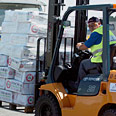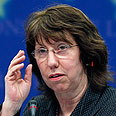

Hamas: Israeli decision to ease blockade 'propaganda'
In response to cabinet's announcement on extension of list of goods transferred to Gaza, Islamist group says, 'We want a real lifting of the siege, not window-dressing.' Top EU official lauds measure, but says Israel must 'make sure many, many more goods can get into Strip
While the European Union lauded Israel's decision on Thursday to ease its blockade on Gaza, Hamas dismissed the new measures as trivial and "media propaganda."
An Israeli statement, issued after a security cabinet meeting, said "it was agreed to liberalize the system by which civilian goods enter Gaza (and) expand the inflow of materials for civilian projects that are under international supervision."
Hamas spokesman Sami Abu Zuhri said, "What is needed is a complete lifting of the blockade. Goods and people must be free to enter and leave. Gaza especially needs construction material, which must be allowed to come in without restrictions."
The spokesman also called for the reopening of the crossings along the Israel-Gaza border and freedom of movement for the residents of the coastal enclave. Abu Zuhri also demanded that Israel authorize the transfer of construction material, petrol and electricity and lift restrictions on the activity of Gaza's financial institutions.
Israel has said unrestricted import of cement and steel could lead to Hamas Islamists seizing the material and using it to rebuild military infrastructure. It already allows in limited quantities of construction material for UN projects.
"From our standpoint, the Israeli decision is worthless, and this is why we are calling for the continuation of international solidarity efforts aimed at breaking the blockade," said the spokesman.
Hamas lawmaker Salah Bardawil said, "We want a real lifting of the siege, not window-dressing," while Muhammad Awad, the secretary general of the Hamas government, said Israel's decision was aimed at "bypassing the international community's demand to lift the blockade entirely.
"The Israeli demands will only perpetuate tensions in the region," he said.
Israel's announcement did not specify how procedures for the import of commercial goods would change or list any specific products, saying only that cabinet ministers would decide in the coming days how to implement the revised policy.
But it noted "existing security procedures to prevent the inflow of weapons and war materials" would continue.
'The detail is what matters'
Defense Minister Ehud Barak later told reporters more goods would reach the Gaza Strip "without lifting the sea blockade," a measure Israel says is aimed at curbing arms smuggling to Hamas.
In response to Israel's decision, the Jordanian government in Amman said, "Any measure that will ease the pressure on Gaza is a step in the right direction, but such cosmetic changes will not resolve the situation."
Some 1.5 million people live in Gaza, of whom about 1 million depend to some extent on regular supplies of UN and other foreign aid brought in overland after Israeli inspection.
Israel faced increased international calls to ease or lift its Gaza embargo following the killing by Israeli commandos of nine pro-Palestinian Turkish activists during the interception at sea of a Gaza-bound flotilla on May 31.
Israeli leaders said the troops acted in self-defense after being swarmed by activists who attacked them. Once-close Muslim ally Turkey accused Israel of "state terrorism."
Commenting on the revised embargo, a Turkish Foreign Ministry official said Ankara wanted to evaluate the Israeli move and see how it would be implemented.
"However, our attitude on the issue is obvious, we expect that the blockade be lifted altogether," the official said.
EU foreign policy chief Catherine Ashton lauded Israel's decision, but said officials wanted to see how it is carried out.
"The detail is what matters," she said. Israel must "make sure that many, many more goods can get into Gaza to enable people to reconstruct their homes, to build schools, to place infrastructure, and also enable people to get on with ordinary lives."
She said EU officials will discuss the possibility of helping reopen Gaza's border crossings. The EU helped monitor Gaza's southern border with Egypt until Hamas took power in 2007.
Humanitarian aid shipments are transferred regularly via border crossings with Israel, but international aid groups say more supplies are needed.
Reuters, AFP and AP contributed to the report















